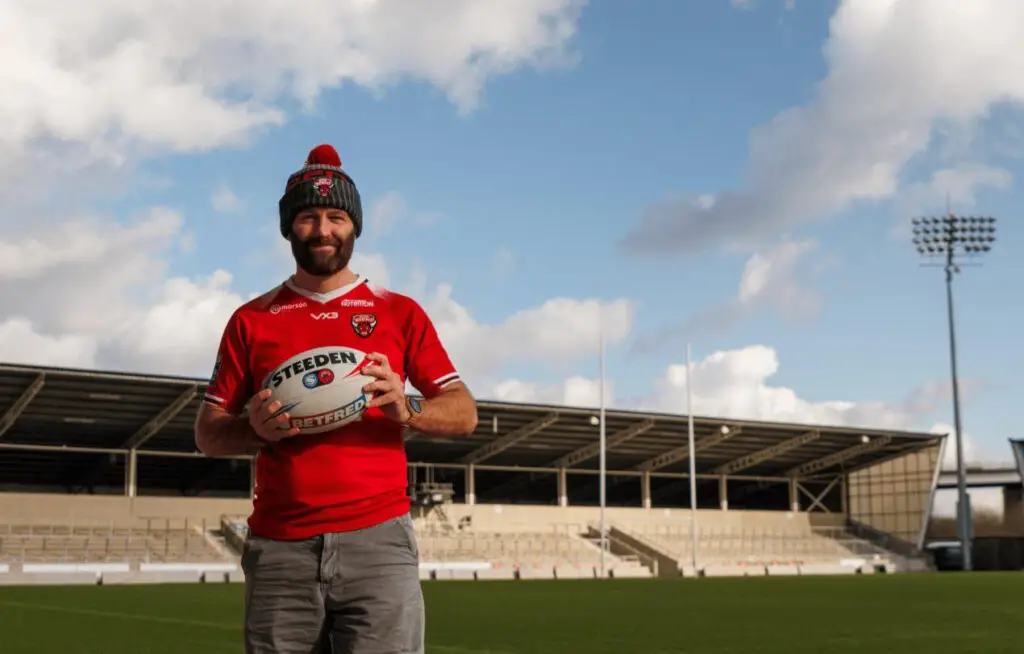Salford City Council’s cabinet has officially approved the complete acquisition of the Salford Community Stadium, home to the Salford Red Devils and Sale Sharks. This decision, following extensive negotiations, signifies the council taking full ownership of the stadium and the adjacent development plots, which hold untapped potential.
Salford Mayor Paul Dennett described the deal as ‘landmark’, marking the end of The Peel Group’s involvement with the site, located near Barton Airfield and the Trafford Centre. ‘Through sole ownership, we’ll be able to open up this area of the city for future redevelopment and regeneration of the adjacent development land plots. This will create new jobs, deliver social value, and attract significant private sector investment, all of which will be vital for the city and local communities,’ Dennett stated.
The council will purchase the remaining 50 per cent of shares in Salford Community Stadium Limited, currently co-owned by Salford City Council and The Peel Group. The stadium already hosts Salford Red Devils, Sale Sharks, the Rugby League World Cup, and the upcoming Women’s Rugby World Cup in 2025.
Dennett emphasized that this deal aligns with the city’s new Rugby Strategy and Sports and Leisure Strategy, both under development. This decision is also integral to the council’s Corporate Plan over the next four years, focusing on making the city fairer, greener, healthier, and more inclusive. Investments have also been made in tennis, futsal, and gym facilities, supporting grassroots clubs and positioning the city as a cultural hub through significant funding into The Lowry, the BBC Philharmonic, and RHS Bridgewater.
‘It is a momentous and truly exciting day for the city. This landmark decision is the beginning of a new future for the stadium and the clubs that call it home. It helps to secure their future, particularly Salford Red Devils, but also the future of rugby across the city. Yes, rugby is at the heart of this decision, but there are so many more benefits that just make this decision a sensible one. It’s a decision rooted in strategic redevelopment, regeneration, skills and work opportunities, health and well-being, community engagement, and supporting grassroots sports,’ Dennett expressed.
Mayor of Greater Manchester Andy Burnham also supported the decision, stating, ‘This is fantastic news for Salford and for rugby fans across Greater Manchester. Mayor Dennett and Salford City Council have taken an important step to protect our city-region’s great sporting heritage and unlock new opportunities for growth and regeneration. The Salford Community Stadium is not just a sports venue – it’s a community asset, and a symbol of our passion and ambition for both codes of the game. Together with the other iconic grounds in Greater Manchester, it is proof that this is the sporting capital of the country.’
Nic Beech, Vice-Chancellor of Salford University, praised the decision as a significant advancement in Salford’s regeneration. ‘The stadium will play a crucial role in fostering local pride, driving economic growth, and creating opportunities for all. We celebrate this milestone and look forward to the positive impact it will have on our city and its future.’
However, the small Conservative opposition on Salford City Council adamantly opposed Dennett’s stance. Councillor Robin Garrido argued that Salford Red Devils should repay loans to the council, questioning the suitability of the club for the Super League given its small fanbase. He criticised the council’s spending priorities, suggesting that funds would be better allocated to road repairs and community facilities. ‘Paul Dennett believes in a socialist state owning public buildings. He complains the Council has no money and is suffering from austerity. I say the money would be better spent on repairing potholes in the roads and on community facilities,’ Garrido commented.
Garrido further added, ‘Salford Red Devils Rugby League club needs to get their own house in order and make the club self-supporting, they’ve had every opportunity to make themselves successful with a free stadium that is usually only a third full.’
The council’s acquisition of Salford Community Stadium is a pivotal development for the city, with the potential for job creation, social value, and private sector investment. Despite opposition, the decision aligns with strategic priorities for the city’s redevelopment and cultural enhancement, promising a dynamic future for both the stadium and the community it serves.

